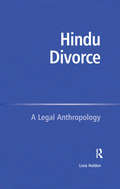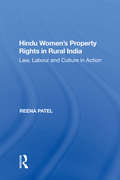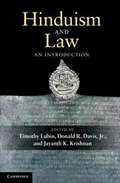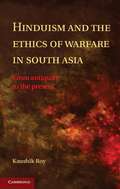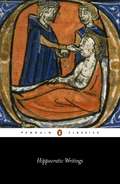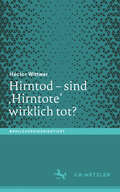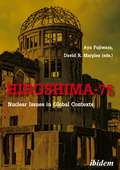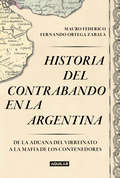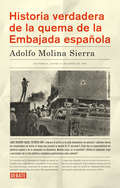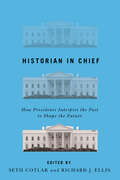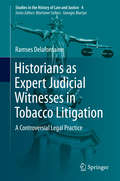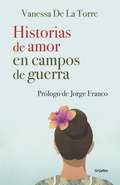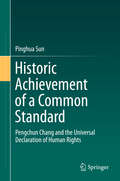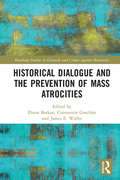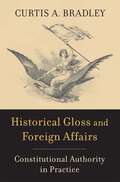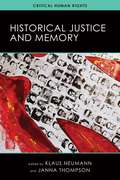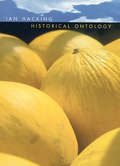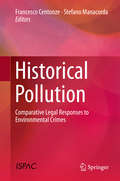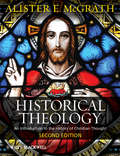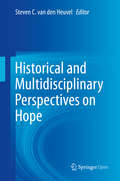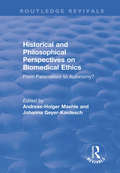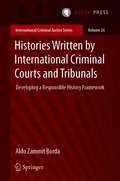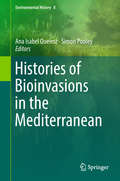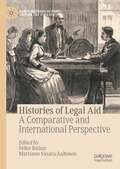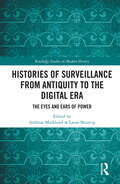- Table View
- List View
Hindu Divorce: A Legal Anthropology
by Livia HoldenThis comparative study investigates the place of Hindu divorce in the Indian legal system and considers whether it offers a way out of a matrimonial crisis situation for women. Using the narratives of the social actors involved, it poses questions about the relationship between traditional jurisdictions located in rural areas and the larger legal culture of towns and cities in India, and also in the UK and USA. The multidisciplinary approach draws on research from the social sciences, feminist and legal studies and will be of interest to students and scholars of law, anthropology and sociology.
Hindu Women's Property Rights in Rural India: Law, Labour and Culture in Action
by Reena PatelHindu women in India have independent right of ownership to property under the Law of Succession (The Hindu Succession Act, 1956). However, during the last five decades of its operation not many women have exercised their rights under the enactment. This volume addresses the issue of Hindu peasant women's ability to effectuate the statutory rights to succession and assert ownership of their share in family land. The work combines a critical evaluation of law with economic analyses into allocation of resources within the family as a means of addressing gender relations and explaining resulting gender inequalities.
Hinduism and Law: An Introduction
by Donald R. Davis Jr. Timothy Lubin Jayanth K. KrishnanCovering the earliest Sanskrit rulebooks through to the codification of 'Hindu law' in modern times, this interdisciplinary volume examines the interactions between Hinduism and the law. The authors present the major transformations to India's legal system in both the colonial and post colonial periods and their relation to recent changes in Hinduism. Thematic studies show how law and Hinduism relate and interact in areas such as ritual, logic, politics, and literature, offering a broad coverage of South Asia's contributions to religion and law at the intersection of society, politics and culture. In doing so, the authors build on previous treatments of Hindu law as a purely text-based tradition, and in the process, provide a fascinating account of an often neglected social and political history.
Hinduism and the Ethics of Warfare in South Asia
by Kaushik RoyThis book challenges the view, common among Western scholars, that precolonial India lacked a tradition of military philosophy. It traces the evolution of theories of warfare in India from the dawn of civilization, focusing on the debate between Dharmayuddha (Just War) and Kutayuddha (Unjust War) within Hindu philosophy. This debate centers around four questions: What is war? What justifies it? How should it be waged? And what are its potential repercussions? This body of literature provides evidence of the historical evolution of strategic thought in the Indian subcontinent that has heretofore been neglected by modern historians. Further, it provides a counterpoint to scholarship in political science that engages solely with Western theories in its analysis of independent India's philosophy of warfare. Ultimately, a better understanding of the legacy of ancient India's strategic theorizing will enable more accurate analysis of modern India's military and nuclear policies.
Hippocratic Writings
by HippocratesThis work is a sampling of the Hippocratic Corpus, a collection of ancient Greek medical works. At the beginning, and interspersed throughout, there are discussions on the philosophy of being a physician. There is a large section about how to treat limb fractures, and the section called The Nature of Man describes the physiological theories of the time. The book ends with a discussion of embryology and a brief anatomical description of the heart.
Hirntod – sind ‚Hirntote‘ wirklich tot? (#philosophieorientiert)
by Héctor WittwerDas Buch bietet den ersten deutschsprachigen Überblick über die Hirntoddebatte. Dabei geht es um die Frage, ob Patienten, bei denen der vollständige und unumkehrbare Ausfall der Hirnfunktionen diagnostiziert wurde, tot oder lebendig sind. Nicht nur in Deutschland gilt der Hirntod heute als medizinisches und rechtliches Kriterium für den Eintritt des menschlichen Todes. Die Frage nach der Richtigkeit des Hirntodkriteriums ist nicht nur von theoretischem Interesse. Vielmehr kommt ihr deshalb eine besondere praktische Relevanz zu, im Kontext der Organtransplantation fast überall die sog. Totspenderregel gilt, d.h., Organe für die Transplantation dürfen (mit wenigen Ausnahmen) nur Toten entnommen werden. Allerdings mehren sich seit den 2000er Jahren Zweifel an der Richtigkeit dieses Kriteriums. Empirische Befunde zeigen, dass bei den sog. Hirntoten zahlreiche Lebensfunktionen intakt sind, obwohl diese nicht mehr vom Gehirn gesteuert werden. ‚Hirntote‘ können z.B. wachsen, die Geschlechtsreife erreichen oder ein Kind austragen. Diese Feststellung lässt vermuten, dass das Gehirn für die Aufrechterhaltung der Vitalfunktionen nicht so wichtig ist, wie die Verfechter des Hirntodkriteriums annehmen. Man kann weiterhin fragen, ob typische Merkmale von ‚Hirntoten‘ mit dem allgemein anerkannten Verständnis des Begriffs ‚Tod‘ vereinbar sind. Damit man ihnen Organe für die Transplantation entnehmen kann, müssen Hirntote beispielsweise künstlich ernährt werden. Kann man ohne Widerspruch behaupten, dass ein Organismus einerseits tot ist und dass er andererseits Nahrung benötigt, künstlich ernährt wird und einen Stoffwechsel mit seiner Umwelt vollzieht? Der Autor stellt alle geläufigen Argumente für und gegen die Angemessenheit des Hirntodkriteriums dar und prüft diese kritisch. Er vertritt die These, dass die Auffassung, hirntote Patienten seien tot, unhaltbar ist.
Hiroshima-75: Nuclear Issues in Global Contexts
by David Marples Fujiwara Aya75 years after the United States dropped the world’s first atomic bombs on the Japanese cities of Hiroshima and Nagasaki, a group of international scholars offers new perspectives on this event and the history, development, and portrayal of the utilization of atomic energy: in military and civilian industries, civil nuclear power, literature and film, and the contemporary world. What lessons have we learned since the end of the Second World War? Can we avoid disasters such as Chernobyl and Fukushima? Have we learned to live with man-made nuclear power in the 21st century?
Historia del contrabando en la Argentina: De la aduana del virreinato a la mafia de los contenedores
by Mauro Federico Fernando Ortega ZabalaGenealogía de una actividad ilegal millonaria, varias veces superior al producto bruto interno, que involucró a los más altos funcionarios desde los orígenes hasta la actualidad del país. La patria nació bajo el signo del contrabando. Moreno, Belgrano, Brown y Rivadavia fueron de los primeros en desarrollar en el Río del Plata esta práctica que busca burlarse de aduanas y fronteras. Desde aquel momento inaugural, el contrabando se fue haciendo cada vez más complejo y se extendió al narcotráfico, a la trata de personas y al lavado de dinero. Algo que terminó asociándolo con la violencia y el crimen organizado. La Argentina tiene una larga historia de comercio ilegal en el que se mezclan multimillonarios negocios privados con la corrupción del Estado. En Historia del contrabando en la Argentina, Mauro Federico y Fernando Ortega Zabala realizan una documentada reconstrucción de la trama de este delito -con datos desconocidos hasta ahora-, en el que estuvieron y están involucrados altos personajes del poder, desde Menem a Macri. Este libro pone en evidencia que la ilegalidad sigue siendo parte ineludible del paisaje nacional.
Historia verdadera de la quema de la Embajada española
by Gustavo Adolfo Molina SierraLo sucedido en la Embajada de España no puede ser tomado como una coincidencia o casualidad. Por el contrario, todo se integra como parte de un plan, eso sí, mal ejecutado, que al salirse de control falló aparatosamente y causó una tragedia. Aun así se trató de sacar provecho de esta desgracia. Estos intentos mantuvieron el caso activo, pero no existió la voluntad política para investigarlo judicialmente hasta el 2014. Guatemala, jueves 31 de enero de 1980. ¿Qué sucedió en aquel fatídico día? ¿Ingresó la policía a la sede diplomática sin permiso? ¿Quienes fueron los responsables de iniciar el fuego que provocó la muerte de 37 personas? ¿Cuál fue la responsalibidad del gobierno español y de su embajador en Guatemala, Máximo Cajal, en lo sucedido? ¿Utilizó el embajador Cajal a personas de la vida política y académica guatemalteca como señuelo? ________________________________________________________________ A lo largo de 40 años, desde aquella lejana fecha del jueves 31 de enero de 1980, Adolfo Sierra Molina ha recopilado cuanta información se ha publicado relacionada con la ocupación y quema de la Embajada de España. Se convirtió también en una de las voces que desde el inicio expuso, a través de numerosos artículos y dando su testimonio una y otra vez, la versión de hechos de los que él fue testigo y que ha ido completando con las pruebas de personas que estuvieron presentes. Su padre, Adolfo Molina Orantes, un destacado abogado, académico, humanista y exfuncionario, murió tragicamente junto a otras 36 personas, entre las que se encontraban Eduardo Cáceres Lehnhoff, funcionarios españoles, personal guatemalteco, así como los que tomaron la sede diplomática desde las primeras horas de la mañana. Uno de los invasores fue encontrado con vida por los bomberos cuando ingresaron al despacho del embajador Máximo Cajal López, quien, minutos antes, había salido caminando de la habitación en la que se habían atrincherado. Adolfo Molina Sierra revela y analiza lo sucedido poniendo los puntos sobre las ies y señalando sin tapujos a los responsables en una historia que no es solo suya, sino también de Guatemala.
Historian in Chief: How Presidents Interpret the Past to Shape the Future
by Rick Perlstein John Milton Cooper Jr. Kathleen Dalton James T. Kloppenberg Jeffrey L. Pasley David Waldstreicher David Sehat Jonathan Earle Edward Countryman Charlie Laderman Elvin T. LimPresidents shape not only the course of history but also how Americans remember and retell that history. From the Oval Office they instruct us what to respect and what to reject in our past. They regale us with stories about who we are as a people, and tell us whom in the pantheon of greats we should revere and whom we should revile. The president of the United States, in short, is not just the nation’s chief legislator, the head of a political party, or the commander in chief of the armed forces, but also, crucially, the nation’s historian in chief.In this engaging and insightful volume, Seth Cotlar and Richard Ellis bring together top historians and political scientists to explore how eleven American presidents deployed their power to shape the nation’s collective memory and its political future. Contending that the nation’s historians in chief should be evaluated not only on the basis of how effective they are in persuading others, Historian in Chief argues they should also be judged on the veracity of the history they tell.
Historians as Expert Judicial Witnesses in Tobacco Litigation
by Ramses DelafontaineHistorian Ramses Delafontaine presents an engaging examination of a controversial legal practice: the historian as an expert judicial witness. This book focuses on tobacco litigation in the U. S. wherein 50 historians have witnessed in 314 court cases from 1986 to 2014. The author examines the use of historical arguments in court and investigates how a legal context influences historical narratives and discourse in forensic history. Delafontaine asserts that the courtroom is a performative and fact-making theatre. Nonetheless, he argues that the civic responsibility of the historian should not end at the threshold of the courtroom where history and truth hang in the balance. The book is divided into three parts featuring an impressive range of European and American case studies. The first part provides a theoretical framework on the issues which arise when history and law interact. The second part gives a comparative overview of European and American examples of forensic history. This part also reviews U. S. legal rules and case law on expert evidence, as well as extralegal challenges historians face as experts. The third part covers a series of tobacco-related trials. With remunerations as high as hundreds of thousands of dollars and no peer-reviewed publications or communication on the part of the historians hired by the tobacco companies the question arises whether some historians are willing to trade their reputation and that of their university for the benefit of an interested party. The book further provides 50 expert profiles of the historians active in tobacco litigation, lists detailing the manner of the expert's involvement, and West Law references to these cases. This book offers profound and thought-provoking insights on the post-war forensification of history from an interdisciplinary perspective. In this way, Delafontaine makes a stirring call for debate on the contemporary engagement of historians as expert judicial witnesses in U. S. tobacco litigation.
Historias de amor en campos de guerra
by Vanessa De La TorreEste libro reúne cinco historias que se entrelazan de mujeres que comparten un denominador común: la guerra. Vanessa De La Torre, una de las periodistas más destacadas del panorama actual, inició hace unos años una investigación que resultó en este libro. Historias de amor en campos de guerra reúne los testimonios de seis mujeres extraordinarias que por diversas razones terminaron siendo víctimas de un conflicto armado del que pensaron que nunca podrían librarse, y que, en medio de ese drama, vivieron intensas y memorables aventuras amorosas. De La Torre cuenta, por ejemplo, detalles de la vida de una mujer desplazada antes de llegar a convertirse en una de las cantantes de música popular más exitosas de los últimos tiempos; narra la apasionante aventura que vivió una joven junto al excomandante del M-19 Carlos Pizarro, y recrea los obstáculos que tuvo que enfrentar una exguerrillera que huyó del monte para seguir su corazón. En definitiva, todos los relatos aquí plasmados se entrelazan y, al tiempo que revelan un pasado marcado por la violencia, siembran la sensación de alivio y esperanza que dejan las verdaderas historias de amor. "Desde los más reconocidos protagonistas de nuestra barbarie hasta los más anónimos, el amor ha cruzado por la vida de estos personajes para dotarlos de una humanidad que parecía haber sido devorada por la violencia". Jorge Franco
Historic Achievement of a Common Standard: Pengchun Chang And The Universal Declaration Of Human Rights
by Pinghua SunThe subject of this book is human rights law, focusing on historic achievement of a common standard viewed from a perspective of Pengchun Chang’s contributions to the drafting of the Universal Declaration of Human Rights (UDHR). This is an original research, integrating different research methods: inter-disciplinary approaches, historical and comparative methods, and documentary research and so on. The research findings can be described briefly as follows: Chinese wisdom has played an important role in achieving a common standard for the establishment of the international human rights system, which can be seen by exploring P. C. Chang’s contributions to the drafting of the UDHR. The target readers are global scholars and students in law, politics, philosophy, international relations, human rights law, legal history, religion and culture. This book will enable these potential readers to have a vivid picture of the Chinese contributions to the international human rights regime and to have a better understanding of the significance of the traditional Chinese culture and P. C. Chang’s human rights philosophy of pluralism.
Historical Dialogue and the Prevention of Mass Atrocities (Routledge Studies in Genocide and Crimes against Humanity)
by Elazar Barkan Constantin Goschler James E. WallerThis book brings together a diverse range of international voices from academia, policymaking and civil society to address the failure to connect historical dialogue with atrocity prevention discourse and provide insight into how conflict histories and historical memory act as dynamic forces, actively facilitating or deterring current and future conflict. Established on a variety of international case studies combining theoretical and practical points of view, the book envisions an integrated understanding of how historical dialogue can inform policy, education, and the practice of atrocity prevention. In doing so, it provides a vital basis for the development of preventive policies sensitive to the importance of conflict histories and for further academic study on the topic. It will be of interest to all scholars and students of history, psychology, peace studies, international relations and political science.
Historical Gloss and Foreign Affairs: Constitutional Authority in Practice
by Curtis A. BradleyA new interpretation of the constitutional law of foreign affairs, as it has been developed throughout its history by presidents and by Congress.In the more than 230 years since the Constitution took effect, the constitutional law governing the conduct of foreign affairs has evolved significantly. But that evolution did not come through formal amendments or Supreme Court rulings. Rather, the law has been defined by the practices of Congress and the executive branch, also known as “historical gloss.”Curtis A. Bradley documents this process in action. He shows that expansions in presidential power over foreign affairs have often been justified by reference to historical gloss, but that Congress has not merely stepped aside. Belying conventional accounts of the “imperial presidency” in foreign affairs, Congress has also benefited from gloss, claiming powers for itself in the international arena not clearly addressed in the constitutional text and disrupting claims of exclusive presidential authority.Historical Gloss and Foreign Affairs proposes a constitutional theory that can make sense of these legal changes. In contrast, originalist theories of constitutional interpretation often ignore influential post-Founding developments, while nonoriginalist theories tend to focus on judicial decisions rather than the actions and reasoning of Congress and the executive branch. Moreover, the constitutional theories that do focus on practice have typically emphasized changes at particular moments in time. What we see in the constitutional law of foreign affairs, however, is the long-term accumulation of nonjudicial precedents that is characteristic of historical gloss. With gloss confirmed as a prime mover in the development of foreign affairs law, we can begin to recognize its broader status as an important and longstanding form of constitutional reasoning.
Historical Justice and Memory
by Klaus Neumann Janna ThompsonHistorical Justice and Memory highlights the global movement for historical justice--acknowledging and redressing historic wrongs--as one of the most significant moral and social developments of our times. Such historic wrongs include acts of genocide, slavery, systems of apartheid, the systematic persecution of presumed enemies of the state, colonialism, and the oppression of or discrimination against ethnic or religious minorities. The historical justice movement has inspired the spread of truth and reconciliation processes around the world and has pushed governments to make reparations and apologies for past wrongs. It has changed the public understanding of justice and the role of memory. In this book, leading scholars in philosophy, history, political science, and semiotics offer new essays that discuss and assess these momentous global developments. They evaluate the strength and weaknesses of the movement, its accomplishments and failings, its philosophical assumptions and social preconditions, and its prospects for the future.
Historical Ontology
by Ian HackingWith the unusual clarity, distinctive and engaging style, and penetrating insight that have drawn such a wide range of readers to his work, Ian Hacking here offers his reflections on the philosophical uses of history. The focus of this volume, which collects both recent and now-classic essays, is the historical emergence of concepts and objects, through new uses of words and sentences in specific settings, and new patterns or styles of reasoning within those sentences. In its lucid and thoroughgoing look at the historical dimension of concepts, the book is at once a systematic formulation of Hacking's approach and its relation to other types of intellectual history, and a valuable contribution to philosophical understanding. Hacking opens the volume with an extended meditation on the philosophical significance of history. The importance of Michel Foucault--for the development of this theme, and for Hacking's own work in intellectual history--emerges in the following chapters, which place Hacking's classic essays on Foucault within the wider context of general reflections on historical methodology. Against this background, Hacking then develops ideas about how language, styles of reasoning, and "psychological" phenomena figure in the articulation of concepts--and in the very prospect of doing philosophy as historical ontology.
Historical Pollution
by Stefano Manacorda Francesco CentonzeThis volume examines legal matters regarding the prevention and fighting of historical pollution caused by industrial emissions. "Historical pollution" refers to the long-term or delayed onset effects of environmental crimes such as groundwater or soil pollution. Historical Pollution presents and compares national legal approaches, including the most interesting and effective mechanisms for managing environmental problems in relation with historical pollution. It features interdisciplinary and international comparisons of traditional and alternative justice mechanisms. This book will be of interest to researchers in criminology and criminal justice and related areas, such as politics, law, and economics, those in the public and private sectors dealing with environmental protection, including international institutions, corporations, specialized national agencies, those involved in the criminal justice system, and policymakers.
Historical Theology
by Alister E. McgrathFreshly updated for this second edition with considerable new material, this authoritative introduction to the history of Christian theology covers its development from the beginnings of the Patristic period just decades after Jesus's ministry, through to contemporary theological trends. A substantially updated new edition of this popular textbook exploring the entire history of Christian thought, written by the bestselling author and internationally-renowned theologian Features additional coverage of orthodox theology, the Holy Spirit, and medieval mysticism, alongside new sections on liberation, feminist, and Latino theologies, and on the global spread of Christianity Accessibly structured into four sections covering the Patristic period, the Middle Ages and Renaissance, the reformation and post-reformation eras, and the modern period spanning 1750 to the present day, addressing the key issues and people in each Includes case studies and primary readings at the end of each section, alongside comprehensive glossaries of key theologians, developments, and terminology Supported by additional resources available on publication at www. wiley. com/go/mcgrath
Historical and Multidisciplinary Perspectives on Hope
by Steven C. van den HeuvelThis open access volume makes an important contribution to the ongoing research on hope theory by combining insights from both its long history and its increasing multi-disciplinarity. In the first part, it recognizes the importance of the centuries-old reflection on hope by offering historical perspectives and tracing it back to ancient Greek philosophy. At the same time, it provides novel perspectives on often-overlooked historical theories and developments and challenges established views. The second part of the volume documents the state of the art of current research in hope across eight disciplines, which are philosophy, theology, psychology, economy, sociology, health studies, ecology, and development studies. Taken together, this volume provides an integrated view on hope as a multi-faced phenomenon. It contributes to the further understanding of hope as an essential human capacity, with the possibility of transforming our human societies.
Historical and Philosophical Perspectives on Biomedical Ethics: From Paternalism to Autonomy? (Routledge Revivals)
by Andreas-Holger Maehle Johanna Geyer-KordeschThis title was first published in 2002: This volume discusses the subject of biomedical ethics. Various views, historical and contemporary, are discussed, with the editors using the contrasting concepts in the shift from paternalism to autonomy in 20th-century medicine as a heuristic tool for the critical study of ethics in medicine.As far as the evidence in this volume goes, paternalistic medical practices and patient autonomy had an uneasy relationship by the beginning of the 20th century. A hundred years later, full autonomy in decisions on medical treatment is still subject to numerous caveats. The text pays close attention to the interplay between various players, noting how factors such as social contexts, governmental organizations and the biotechnological industry influence and shape responses to the principle of bioethics.
Histories Written by International Criminal Courts and Tribunals: Developing a Responsible History Framework (International Criminal Justice Series #26)
by Aldo Zammit BordaThis book argues for a more moderate approach to history-writing in international criminal adjudication by articulating the elements of a “responsible history” normative framework. The question of whether international criminal courts and tribunals (ICTs) ought to write historical narratives has gained renewed relevance in the context of the recent turn to history in international criminal law, the growing attention to the historical legacies of the ad hoc Tribunals and the minimal attention paid to historical context in the first judgment of the International Criminal Court.The starting point for this discussion is that, in cases of mass atrocities, prosecutors and judges are inevitably understood to be engaged in writing history and influencing collective memory, whether or not they so intend. Therefore, while writing history is an inescapable feature of ICTs, there is still today a significant lack of consensus over the proper place of this function. Since Hannah Arendt articulated her doctrine of strict legality, in response to the prosecutor’s expansive didactic approach in Eichmann, the legal debate on the subject has been largely polarised between restrictive and expansive approaches to history-writing in mass atrocity trials. What has been noticeably missing from this debate is the middle ground. The contribution this book seeks to make is precisely to articulate a framework that occupies that ground. The book asks: what are the lenses through which judges of ICTs interpret historical events, what kind of histories do ICTs write? and what kinds of histories should ICTs produce? Its arguments for a more moderate approach to history-writing are based on three distinct, but interrelated grounds: (1) Truth and Justice; (2) Right to Truth; and (3) Legal Epistemology.Different target audiences may benefit from this book. Court officials and legal practitioners may find the normative framework developed herein useful in addressing the tensions between the competing objectives of ICTs and, in particular, in assessing the value of the history-writing function. Lawyers, historians and other academics may also find the analysis of the strengths, constraints and blind spots of the historical narratives written by ICTs interesting. This issue is particularly timely in view of current debates on the legacies of ICTs.Aldo Zammit Borda is Director of the Centre for Access to Justice and Inclusion at Anglia Ruskin University, Cambridge, UK.
Histories of Bioinvasions in the Mediterranean (Environmental History Ser. #8)
by Simon Pooley Ana Isabel QueirozBioinvasions is a current top research subject for natural sciences, social sciences and humanities and a major concern for conservationists, land managers and planners. In the last decades, new findings, perspectives and practices have revealed the multifaceted challenges of preventing new introductions and dealing with those invasive species that harm natural ecosystems, economy and human welfare. This book brings together environmental historians and natural scientists to share their studies and experiences on the human dimensions of biological invasions from the ancient past to the current challenges. The collection of papers focuses on the Mediterranean region and deals with aquatic and terrestrial ecosystems on the mainland and islands, ranging from marine and freshwater environments to coastal marshlands and forests. A wide diversity of animals and plants are featured, from marine fishes to marine and freshwater crustaceans, invertebrates, reptiles and amphibians, birds and mammals, to grasses, shrubs and trees. This book is a contribution to the scientific debate on how to deal with the historical dimensions of biological invasions, fostering dialogue between cultural and ecological explanations of environmental change, to inform environmental policy and management. It has been organized in three sections: the first is the editors’ introduction, in which they review the existing literature and highlight relevant concepts and ideas; the second is about alien species in the Mediterranean region; the third includes cases from other Mediterranean-type regions.
Histories of Legal Aid: A Comparative and International Perspective (World Histories of Crime, Culture and Violence)
by Felice Batlan Marianne Vasara-AaltonenThis book focuses on the history of the provision of legal aid and legal assistance to the poor in the nineteenth and twentieth centuries in eight different countries. It is the first such book to bring together historical work on legal aid in a comparative perspective, and allows readers to analogise and contrast historical narratives about free legal aid across countries. Legal aid developed as a result of industrialisation, urbanization, immigration, the rise of philanthropy, and what were viewed as new legal problems. Closely related, was the growing professionalisation of lawyers and the question of what duties lawyers owed society to perform free work. Yet, legal aid providers in many countries included lay women and men, leading at times to tensions with the bar. Furthermore, legal aid often became deeply politicized, creating dramatic conflicts concerning the rights of the poor to have equal access to justice.
Histories of Surveillance from Antiquity to the Digital Era: The Eyes and Ears of Power (Routledge Studies in Modern History)
by Andreas Marklund; Laura SkouvigDeploying empirical studies spanning from early Imperial China to the present day, 17 scholars from across the globe explore the history of surveillance with special attention to the mechanisms of power that impel the concept of surveillance in society. By delving into a broad range of historical periods and contexts, the book sheds new light on surveillance as a societal phenomenon, offering 10 in-depth, applied analyses that revolve around two main questions: • Who are the central actors in the history of surveillance? • What kinds of phenomena have been deemed eligible for surveillance, for example, information flows, political movements, border-crossing trade, interacting with foreign states, workplace relations, gender relations, andsexuality?
